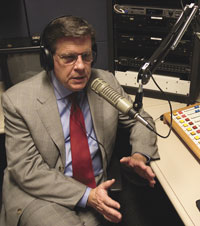The science of happiness

Ryan Tubongbanua / The Collegian
Fresno State graduate Edward Diener came back to his alma mater to discuss happiness. Time magazine called him “Dr. Happiness.” |
By Jaclyne Badal
The Collegian
Happiness is a universal goal and the people who achieve it tend to be more successful in life, according to the man known as Dr. Happiness.
Edward Diener, who graduated from Fresno State in 1968, edits the Journal of Happiness Studies. The University of Illinois psychology professor was back in Fresno on Tuesday night to talk about the science of happiness as part of the University Lecture Series.
Diener has studied happiness for the last 25 years. He’s found that about 40 percent to 50 percent of happiness is inborn, a factor of personality. The other half is influenced by outside forces.
He said people with extraordinarily high goals run the risk of becoming unhappy if they fail to meet their expectations.
“It’s very easy to fall short because you want so much,” Diener said.
People also ran the risk of becoming unhappy when they focused too much on material possessions.
“If you want money more than love, you want it more than health, you’re going to be in trouble,” Diener said. “Life satisfaction rates are low among people who say money is more important than other things.”
He said close, personal relationships —not wealth — were the things that the world’s happiest people had in common.
Psychologists have traditionally ignored subjects such as happiness but Diener said it’s important to remember the positive in life.
“We don’t just want to study parents who abuse their kids,” Diener said. “We want to study kids who something went right for, resilient kids.”
Comment on this story in the News forum >>
|
